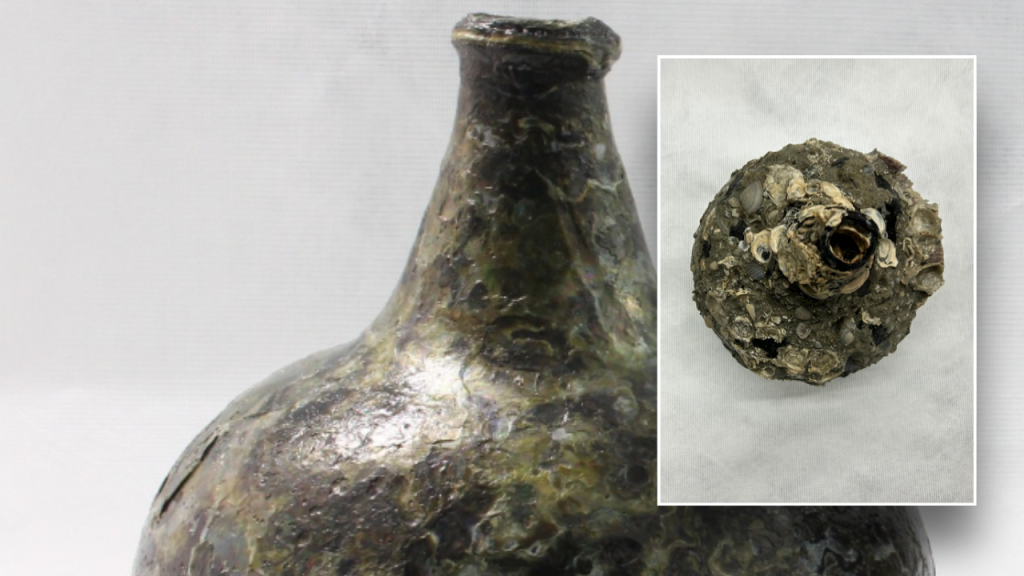Officials in Florida recently revealed the discovery of two 18th-century “onion glasses” found in waters off the coast of Indian River County. The Florida Division of Historical Resources made the announcement on social media, showcasing pictures of the barnacle-covered bottles before and after restoration. The successful restoration was attributed to meticulous cleaning and drying techniques, as well as the use of an acrylic resin consolidant. The bottles were recovered from a shipwreck believed to be part of the Spanish Plate Fleet that was lost at sea in 1715 due to a hurricane.
Mark Ard, Director of External Affairs with the Florida Department of State, described the bottles as a rare find given their intact state despite being submerged underwater for over 300 years. It is speculated that the bottles originally contained some type of alcoholic spirit. Each onion bottle is unique and hand-blown, showcasing variations in size, shape, and weight. These bottles were likely produced in England and would have been used by crew members and passengers onboard ships. The Spanish treasure fleet played a crucial role in global maritime trade during the 18th century, transporting goods from Central and Southern America that had a significant impact on social habits.
The bottles are now part of the Artifact Loan Program in Florida and can be seen on display at various museums across the state, such as History Miami, the Pensacola Museum of History, and the McLarty Treasure Museum in Sebastian. The flow of goods from the Spanish Plate Fleet, including items like chocolate that influenced social customs, was essential for the economies of Spain and other European nations. The use of specific porcelain vessels from China for serving drinking chocolate further highlights the global impact of these trade routes. The discovery of the onion glasses provides valuable insight into the maritime history of the region and the significance of the Spanish treasure fleet during the 18th century.
The bottles were carefully restored using techniques that helped preserve their integrity and historical value. Recovered from a shipwreck with unknown origins, the onion glasses offer a glimpse into the past and the daily lives of sailors and passengers aboard Spanish treasure fleets. Their unique hand-blown design and ties to global trade routes reflect the craftsmanship and connections that shaped historical events. The availability of the onion glasses for loan provides the public with an opportunity to appreciate and learn from these artifacts, enhancing their understanding of maritime history in Florida and beyond. By showcasing these bottles in museums, officials hope to educate visitors about the impact of the Spanish treasure fleet and its role in shaping cultural practices and economies.
The significance of the Spanish Plate Fleet and its impact on global trade is further highlighted by the inclusion of goods like chocolate that were transported onboard these ships. The mixing of sugar and cacao to create drinking chocolate revolutionized social habits at the time and continues to influence modern customs. By displaying the onion glasses in prominent museums, officials aim to raise awareness about the importance of these trade routes and the historical context in which these artifacts were used. The meticulous restoration process and subsequent exhibition of the bottles provide a unique opportunity for the public to connect with the past and appreciate the craftsmanship and skill of those who created these artifacts. Through the Artifact Loan Program, these historical treasures can reach a wider audience and contribute to a better understanding of Florida’s rich maritime history.


